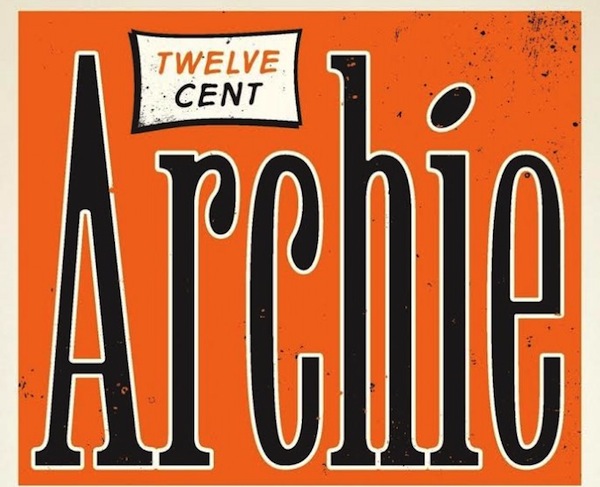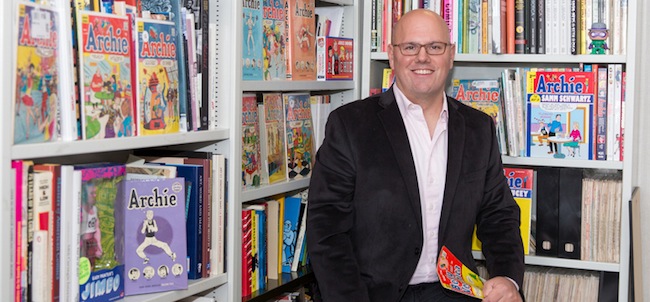Book Review: “Twelve-Cent Archie” — A Highly Entertaining Look at the Teens of Riverdale
What makes Twelve-Cent Archie such a congenial read is that Bart Beaty is a free thinker about comic books, going wherever, and with whatever improvised opinion, through his 100 brisk, chatty chapters.
Twelve-Cent Archie by Bart Beaty. Rutgers University Press, 232 pages, paper $26.95.

By Gerald Peary
When I started in 2011 on my feature documentary Archie’s Betty (2015), I checked to see what scholarship had been done about Archie comics. To my surprise, considering Archie’s extraordinary worldwide popularity for 70 years, I came up with nothing beyond a few educated prefaces to volumes of reissued Archie cartoons. No books at all. It was a similar experience for Bart Beaty, a professor of English at the University of Calgary, when he embarked on his highly entertaining Twelve-Cent Archie (Rutgers University Press, 2015), part of Rutgers’s ongoing Comic Culture series. Beaty was astonished that he could find only one academic article ever about the teenagers of Riverdale, a long-ago 1991 essay on “The Archie Code” in The Journal of Popular Culture.
So Beaty started anew, with the formidable task of being the sole person of record to attempt a scholarly tome about Archie. And with a zillion Archie-related comics to explicate going back to 1941. Impossible! Smartly, Beaty narrowed what he would cover. He decided his research would deal only with those Archie comics that sold for 12 cents, beginning in December 1961, when the price of the perennial dime comic jumped two cents, ending in July 1969, with a monumental three-penny escalation to 15 cents.
Why this time period? To me, the ’60s Archie comic is not substantially different in quality from what went before in the ’40s and ’50s, when the comics were drawn either by Bob Montana, the original Archie cartoonist, or by others instructed to draw and tell stories in the Montana manner. But Beaty makes a polemical case for the superiority of ’60s Archie comics: “the most interesting period of Archie . . . seemed to coincide with the long run of Harry Lucey as the lead artist . . ., the arrival of Don DeCarlo at the company, and Samm Schwartz’s contributions to Jughead. . . . I discovered in the Archie Comics of the 1960s a level of complexity and interest that was entirely unexpected.”
Well, most Archie experts would agree that Samm Schwartz is the finest Jughead cartoonist, and that Don DeCarlo is at the top of the class, and probably drew the sexiest of all Betty and Veronica. However, Beaty is the rare writer to anoint Harry Lucey, who had been Montana’s best friend working at MLJ Comics, as the greatest of all Archie illustrators. He is adamant about it. Beatty recalled his return to Archie after a thirty-year hiatus: “I was instantly and definitely struck by the fact that every single Archie story I loved as a kid was drawn by Harry Lucey.”
I’m sticking with Montana, subject of my film, Archie’s Betty. But if Beaty prefers Lucey, so be it. In fact, what makes Twelve-Cent Archie such a congenial read is that Beaty is a free thinker about comic books, going wherever, and with whatever improvised opinion, through his 100 brisk, chatty chapters. He describes Twelve-Cent Archie as “not a typical scholarly monograph.” The order of chapters is arbitrary, he says, to be perused in any chronology. I found a good way to plow through, by giving myself about 10 chapters, 20 pages, at each read. I skipped some chapters that didn’t grab me, paid deep attention to those which opened up my Archie knowledge.

Bart Beaty, the sole person of record to attempt a scholarly tome about Archie Comics. Photo: Riley Brandt, University of Calgary
Here are some of the insights I got from Bart Beaty:
1. Archie operated as an assembly-line product. “(T)he goal of Archie Comics was not to produce a widely disparate set of stories but to provide readers with essentially the same material month after month.” By the 1960s, Archie succeeded within a “semi-industrialized system” which had been “already in place for 20 years.” Officially, 1960s Archie comics were intended to follow the ways of 1950s and 1960s Archies. I think they did. Beaty makes a case that there was a difference, an improvement, and that Harry Lucey was an “auteur.” Quoth Beaty regarding Archie’s semi-Michelangelo: “One of the great masters of comic-book storytelling through body language. Lucey was seemingly incapable of drawing a meaningless pose.”
2. “Everyone in Riverdale is an only child — it is a town curiously devoid of siblings.” Wow! Beaty is right! In all my Archie days, I never noticed. Creepy! Considering Archie’s readership around the world (huge in India, Spain, Greece, Pakistan), I wonder if there were Archie fans among the bureaucrats in China, inspired by Riverdale for the dictatorial one-child rule.
3. They might be assembly line, but the narratives in Archie comics are remarkably inconsistent. Nobody seems bothered that Archie is a great athlete in one story, a clumsy boob in another, sometimes a fine student, sometimes a terrible one. Nobody notices that Riverdale is sometimes by the ocean, other times snowy for ski season. That Jughead is a total slacker but sometimes has artistic inspirations, including painting abstracts misunderstood by his classmates and teachers. Then the next comic book Jughead is indolent again, only wanting to eat. Beaty: “There is no consequence in the Archie universe beyond the last panel of every story. The characters are devoid of memories, and, as a result, there is no need to make the stories align with each other.” It’s like Vladimir and Estragon in Waiting for Godot‘s second act who have forgotten the first act!
4. In the 1960s comics there is a distinct shift from earlier Archie: the Archie-Betty-Veronica triangle of Bob Montana is no longer operative. Instead, “Archie . . . is engaged in a long-term relationship with Veronica that Betty is constantly attempting to disrupt. . . . a regular, ongoing, if highly vexed romance.”
5. Betty is a bitch. And a psychopath. O sweet Betty, my childhood crush! “Betty has everyone fooled. . . . Betty . . . was conniving and opportunistic. . . . Betty’s behavior . . . often borders on the pathological. . . . Betty’s fixation on Archie is unhealthy and unrequited. . . . Archie creators across the titles repeatedly depict her as a stalker.” Betty, the sex offender! And even, Beaty discovers, a potential murderer in Archie 156 (July 1965), in which she attempts to off Archie by having a tree fall on him.
6. No surprise here: Archie comics is racist. Riverdale in the 1960s remained lily white. Beaty checked out 4,000 Archie stories between 1961 and 1969 and found exactly three panels with people of color, when the Archie crew made an unlikely trip to St. Thomas. Beaty, though Archie-crazy, doesn’t hold back his criticism. “Riverdale’s racial problem is a serious mark against the comic,” he writes. “[It’s] . . . a nostalgic vision of a pre-racial America.”
7. Archie comics, produced in a jiffy, had lots of spelling problems. Beaty, the English prof, couldn’t help but circle in the balloons “delighted,” “risist,” “declair,” and “additude.” And almost 50 years before American Pharoah, the misspelled Triple Crown race horse, there was an Archie story to upset Egyptologists and grammarians, “Pharoah Foul” (Archie 179, February 1968).
8. And thirty years before Seinfeld, “a comic about nothing,” there was Archie “a nonadventure of a small group of friends.” Kramer as the across-the-hall Jughead? Why not?
Gerald Peary is a professor at Suffolk University, Boston, curator of the Boston University Cinematheque, and the general editor of the “Conversations with Filmmakers” series from the University Press of Mississippi. A critic for the late Boston Phoenix, he is the author of 9 books on cinema, writer-director of the documentary For the Love of Movies: the Story of American Film Criticism, and a featured actor in the 2013 independent narrative Computer Chess.
Tagged: Archie, Archie Comics, Archie's Betty, Bart Beaty, Betty, Jughead, Rutgers University Press, Twelve-Cent Archie

I was so pleased when they introduced a gay character….